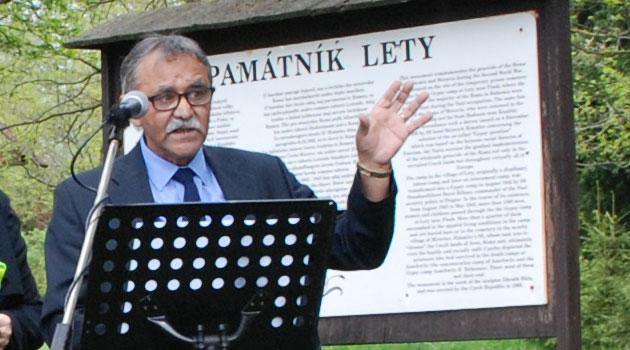Čeněk Růžička: Roma Holocaust survivors will use upcoming compensation for their funeral costs

Yesterday the news server HlídacíPes.org reported on Germany’s breakthrough decision, according to the Czech Foreign Ministry, to further compensate Romani people in the Czech Republic who are Holocaust survivors. Today HlídacíPes.org has published an interview on this and other issues with the President of the Committee for the Redress of the Roma Holocaust in the Czech Republic, Čeněk Růžička.
The activist has been advocating for compensation for the Romani victims of Nazism for some time. Originally from Bohemia, he has also long advocated for other rights for members of his ethnic group.
Růžička has tirelessly criticized the location of an industrial pig farm on the site of the former camp at Lety where hundreds of people were interned during different phases before, during and after the war. Romani people were concentrated there during 1942-1943.
Now, at the age of 70, Růžička seems to be experiencing a change in fortune after a long period of empty promises from Czech politicians. His activities are finally yielding concrete results and contributing to the correction of past injustices.
Through Czech Culture Minister Daniel Herman, the Czech Government has announced that it is committed to closing the farm on the Lety remembrance site. Germany has also promised to pay further compensation to Romani people in the Czech Republic who survived the Holocaust.
Růžička’s Committee in particular will be the intermediary for the new payments going to between 10 and 15 Romani people who survived the horrors of Nazism and survived to this day. Růžička himself, however, says he would not personally accept the compensation from Germany on the terms offered.
Living to see justice done
Q: What is your perception of this decision by the German Finance Ministry to pay the Czech Roma who survived the horrors of Nazism?
A: My perception is from the angle of a person who has been doing his best to advocate for compensation since 1974. I have been very critical of this. What has happened now is a big shift. However, to tell you the truth, if it were just up to me, I would reject Germany’s current proposal of a one-time sum.
Q: For what reason? Through the Foreign Ministry of the Czech Republic you have finally succeeded in achieving what you’ve been striving for all these years… .
A: Because I compare it with how the Jewish victims have been compensated. They receive every month, with each of their pension payments, roughly CZK 7 000 – CZK 8 000 (EUR 260 – EUR 300), which is a substantial amount, overall, and naturally they absolutely deserve it, there’s no doubt about that. However, it’s interesting that Romani people are not entitled to that same compensation, even though they lived through the same wrongdoing. It bothers me that the Roma are considered second-class victims.
Q: Ultimately, though, you acceded to the compensation being paid as a lump sum. Why?
A: Because the applicants are very elderly people who might not live to see more progress.
Q: How old are the people who have already applied for compensation and how many of them are there?
A: For the time being, 10 applications have been filed. The youngest was two years old at the time he entered the concentration camp, otherwise all of them are around 80 years old now and the oldest applicant is 89. Three of them are permanently bedridden and one is in a wheelchair.
Q: You are in contact with all of them?
A: Yes. I wanted their applications to be irrefutable, so I visited each of them and aided them with compiling all the background documentation they needed. However, it was difficult to convince them to do it, they no longer believed they could succeed, and after what they’ve lived through, they were also afraid to release their personal information. Finally, though, they filed their applications.
Q: Since you know these people, have you talked with them about how they will spend the money?
A: Yes. All will be saving it for their own funerals.
Q: What do you mean?
A: For you it might be surprising, but among Romani people, death and funerals are taken very seriously. In our culture, for example, it’s not possible to let ourselves be cremated. The burial must be in the earth and it must be a magnificent event – a wooden coffin, many fresh flowers, many guests, and mainly it must follow our traditions.
This piece was written for the Institute of Independent Journalism (Ústav Nezávislé Žurnalistiky), an independent nonprofit organization and registered institute in the Czech Republic that provides information, journalism and news reporting. The analyses, articles and data produced by the Institute are offered to all for use without precondition.